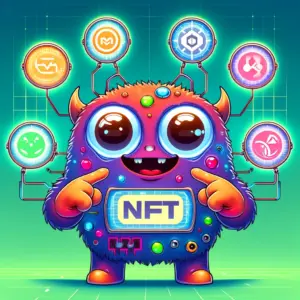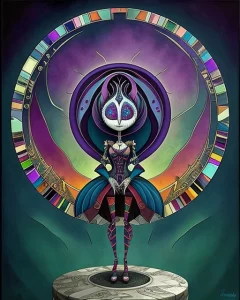The world of NFTs, or non-fungible tokens, has exploded in recent years, captivating everyone from art enthusiasts to tech-savvy investors. Minting – the process of converting a digital asset into a unique, blockchain-registered NFT – offers creators a potential avenue for monetization and collectors a chance to own exclusive digital items. But the question of true ownership often arises. While minting imbues an NFT with verifiable scarcity and authenticity, does it automatically grant you complete ownership of the underlying asset itself? Dive deeper with us as we navigate this multifaceted question and explore the nuances of NFT ownership.
Understanding the NFT Ecosystem:
Before delving into ownership intricacies, let’s set the stage. An NFT acts as a unique digital certificate stored on a blockchain, a decentralized public ledger. This certificate points to a digital asset, which can be anything from artwork and music to in-game items and virtual real estate. Minting essentially inscribes this digital asset onto the blockchain, establishing its uniqueness and verifiable ownership history.
Ownership Spectrum: Beyond Just the Token:
Now, the crucial question: What exactly do you own when you mint an NFT? It’s important to understand that NFT ownership comes with varying degrees and nuances:
1. Ownership of the NFT Token:
Undoubtedly, minting grants you ownership of the NFT token itself. This implies you possess the exclusive right to control and manage this token on the blockchain. You can freely sell, trade, or hold it, enjoying the benefits associated with its value and potential appreciation.
2. Ownership of the Digital Asset (The Artwork, Music, etc.):
This is where things get murky. Minting an NFT doesn’t automatically grant you ownership of the underlying digital asset it points to. In most cases, the original creator retains copyright and intellectual property rights. This means you cannot freely replicate, modify, or commercially exploit the asset without their permission. Think of it like owning a signed copy of a famous painting; you own the physical copy (the signed NFT), but the copyright to the artwork itself remains with the creator.
3. Usage Rights and Licensing:
Some NFT projects might explicitly grant specific usage rights or licenses to holders. These could include commercial usage rights, access to exclusive communities, or even voting rights within the project’s governance. Always refer to the specific project’s terms and conditions to understand the extent of these rights.
Exploring the Nuances:
Remember, the NFT space is still evolving, and ownership models vary greatly across projects. Here are some key aspects to consider:
- Platform Terms and Conditions: Each NFT platform (think OpenSea, Rarible) has its own terms regarding ownership and intellectual property. Carefully review these terms before minting or trading NFTs.
- Specific Project’s License: As mentioned earlier, some projects offer specific licenses alongside the NFT, granting additional usage rights. Always consult the project’s documentation for clarity.
- Underlying Asset Type: Different digital asset types might have varying ownership implications. For instance, owning an NFT representing a song doesn’t necessarily grant you the right to publicly distribute the music itself.
Beyond Ownership: The Value Proposition of NFTs:
While complete ownership of the underlying asset might not be the sole takeaway, NFTs offer valuable propositions beyond that:
- Verifiable Scarcity and Authenticity: NFTs provide a tamper-proof way to establish the uniqueness and authenticity of digital assets, offering collectors confidence and security.
- Fractional Ownership: NFTs can be fractionalized, allowing multiple individuals to co-own a valuable digital asset, opening up investment opportunities to a wider audience.
- Community Building and Governance: NFTs can serve as membership tokens, granting access to exclusive communities and even voting rights within certain projects, fostering a sense of belonging and shared ownership.
Owning NFTs: A Calculated Move:
Minting an NFT can be an exciting opportunity, but it’s crucial to approach it with a clear understanding of what you’re acquiring. Don’t assume automatic ownership of the underlying asset; always research the project, its terms, and the creator’s rights. Treat NFTs as unique digital collectibles with potential value, but be mindful of the limitations associated with ownership. Remember, the true value of an NFT often lies beyond just claiming sole proprietorship; it’s about the community, utility, and unique experiences it unlocks.
Additional Resources:
- OpenSea: https://opensea.io/
- Rarible: https://rarible.com/
- NFT Now: https://nftnow.com/






